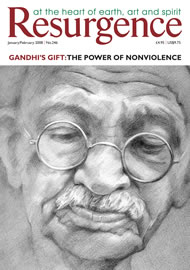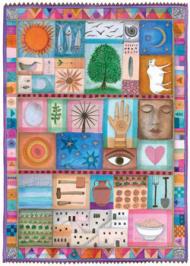MAHATMA GANDHI HELD no office, pursued no career, accumulated no wealth and desired no fame. Yet millions of people in India and around the world are captivated by his life and his achievements. Gandhi inspired so many because he practised what he preached: he lived the change he wanted to see in the world and his message was none other than his life itself. He was an honest seeker of truth, a fearless defender of the weak, and an uncompromising practitioner of nonviolence.
He was born Mohandas Karamchand Gandhi on 2nd October 1869 in the town of Porbandar, Gujarat in western India. His father, a devout Hindu, was Prime Minister in his native princely state. The young Gandhi was sent to England to study law. Then he went to South Africa to practise it. There he was thrown out of a segregated train on the grounds of his colour. Shaken by this unjust encounter, Gandhi mounted a nonviolent civil disobedience campaign to expose the evils of apartheid. Inspired by the writings and example of Henry David Thoreau, Gandhi stirred the political circles of South Africa. He called his campaign Truth Force; in Sanskrit, Satyagraha. Faced with the brute force of weapons and prisons Gandhi used the power of nonviolence and truth and proved its superiority. Surprised by the use of this technique, the perpetrators of injustice and discrimination found themselves confused and powerless. Thus the seeds of freedom from apartheid were sown in South Africa.
On returning to India, Gandhi refined his techniques of Satyagraha and introduced them to empower the people of India to wage their struggle for freedom from colonialism. His movement became so powerful and effective that Britain could not withstand it and eventually agreed to grant independence to India. While the struggle was in progress, Gandhi was working on ideas of a new social order for post-colonial India. He believed that there would be no point in getting rid of the British without getting rid of the centralised, exploitative and violent system of governance and the economics of greed that it pursued. Just replacing white rulers with brown rulers would be no freedom at all. So Gandhi designed a new trinity to achieve his vision of a new nonviolent social order for a truly free India.
THE FIRST PART of this trinity was Sarvodaya: Upliftment of All. The Western system of governance is based on the rule of the majority, so-called
democracy. This was not good enough for Gandhi. He wanted no division between the majority and the minority. He wanted to serve the interests of each and every one: of all. Democracy is also limited to care for the interests of human beings. Democracy working with capitalism favours the few who have capital. Democracy together with socialism favours the majority, but is still limited to humans. Sarvodaya includes the care of the Earth: of animals, forests, rivers and land as well as all people. For Gandhi, life is sacred and so he advocated reverence for all life, humans as well as other than humans.
The second part of the Gandhian trinity is Swaraj: Self Government. Swaraj works to bring about a social transformation through small-scale, decentralised and participatory structures of government on the one hand, and, on the other, Swaraj implies self-transformation, self-discipline and self-restraint on a personal level. “There is enough in the world for everybody’s need, but not enough for anybody’s greed,” said Gandhi. So a moral,
ethical, ecological and spiritual foundation in the personal, social and political sphere is necessary to build good governance.
The third part of the trinity is Swadeshi: Local Economy. Gandhi opposed mass production and favoured production by the masses. Work for him is as much a spiritual necessity as it is economic. So he insisted on the principle that every member of society should be engaged in manual work. Manufacturing in small workshops and adherence to arts and crafts feeds the body as well as the soul, professed Gandhi. He believed that long-distance transportation of goods, competitive trading and relentless economic growth would destroy the fabric of human communities as well as the integrity of the natural world.
GANDHI WAS a great champion of Hindu–Muslim solidarity. This was appreciated by neither the fundamentalist Hindus nor the fundamentalist Muslims. Against the wishes of Gandhi, India was partitioned on religious lines and hundreds of thousands of Hindus and Muslims were massacred or made refugees. One Hindu fundamentalist, Nathuram Godse, assassinated Gandhi on 30th January 1948, just six months after India’s independence. As a consequence, Gandhi lost the opportunity to work for a new social order, and his trinity had only a limited impact. Now, sixty years on, we see the influence of Gandhi being revived through the rise of interest in ecology, peace and social justice.
For further information see An Autobiography: The Story of My Experiments with Truth, Penguin, USA, £9.99.







